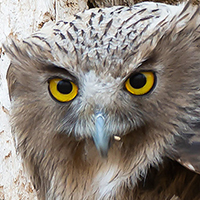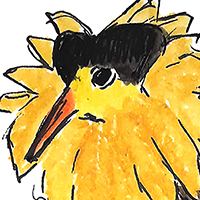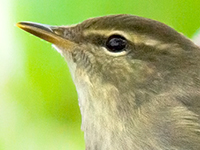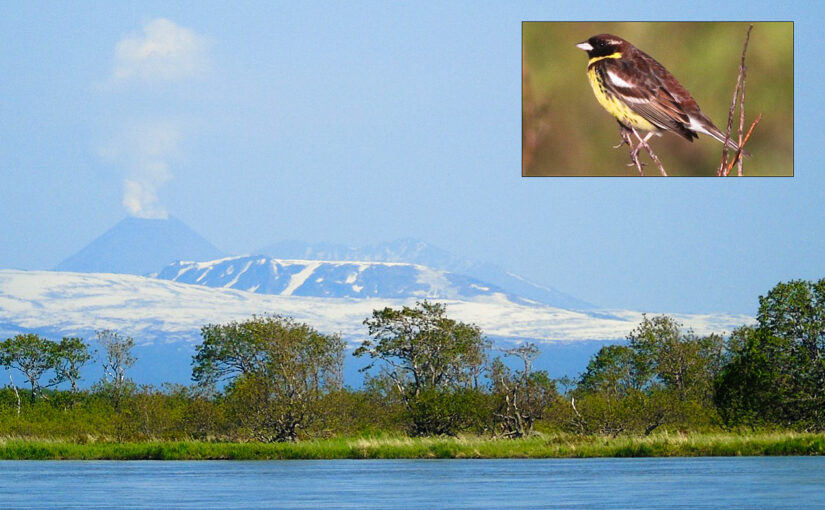by Christoph Zöckler
for shanghaibirding.com

Yellow-breasted Bunting Emberiza aureola was once very common—one of the most common birds in Eurasia, with a population in the hundreds of millions. Its breeding range stretched from Finland to the Russian Far East. It was so common that nobody paid much attention to it. Then, suddenly, in place after place throughout its range, the song of the bunting was no longer heard.
What happened? Research by Kamp et al. (2015) revealed that the “rice bird,” as it is known in China because of its habit of flocking and feeding in rice paddies, has been hunted with nets and caught by the millions—all so that it can be served as a delicacy in restaurants. The population is estimated to have declined by up to 95 percent in just 30 years. Although in China since 1997 the hunting and trade of Yellow-breasted Bunting are no longer permitted, the authorities have been unable to bring the killings to a complete halt (Heim et al. 2021). Today Yellow-breasted Bunting is listed as critically endangered.
There is a place, however, where Yellow-breasted Bunting is holding on: Russia’s Kamchatka Peninsula.
In recent years I have had the privilege of traveling to Kamchatka as a tour guide for Heritage Expeditions. The cruise takes you to the mouth of the Zhupanova River on the east coast of Kamchatka. Steller’s Sea Eagle, largest of the world’s sea eagles, is the main attraction here. Another attraction is Yellow-breasted Bunting. In breeding plumage the male is strikingly colorful. Most attractive, I think, is its beautiful, evocative song, which in June leads us to the bird, singing in the willows along the banks of the Zhupanova.
We switch off the boat’s engines and drift slowly with the current. The backdrop is stunning—a lush green shoreline of willow and alder trees with snowy mountains in the background. If you are lucky, you will see volcanoes in the distance spouting ash. A Steller’s Sea-Eagle passes by, low. Camera shutters fire off, then it is quiet again, and from the willows we hear birdsong: Kamchatka Leaf Warbler, Siberian Rubythroat, a distant Rufous-tailed Robin, Rustic Bunting, and Yellow-breasted Bunting. Its song, reminiscent of Ortolan Bunting in Europe, is much more melodic than that of other buntings in the region.
Although its breeding range has contracted eastward some 5,000 km (3,100 mi.), Yellow-breasted Bunting is still doing all right in Kamchatka. According to Yuri Gerasimov, a local ornithologist who has been monitoring the species on the peninsula, the bunting has been recovering in recent years.
In China and Southeast Asia, awareness-raising campaigns may be having an effect. Also helping is the critically endangered status, which has triggered monitoring and research throughout its range. Remarkably, more than 6,300 Yellow-breasted Bunting recently were recorded in the central Irrawaddy River Delta in Myanmar, the largest roosting site in Southeast Asia (Thet Zaw Naing et al. 2023). These findings suggest that Yellow-breasted Bunting may be on the road to recovery. Let’s hope the buntings continue to escape the nets of the rice farmers and find their way back to their amazing paradise in the Russian Far East.
SOUND-RECORDINGS
Here are two sound-recordings from Kamchatka:
Yellow-breasted Bunting Emberiza aureola, song, Atlasovo (55.598611, 159.701667), Kamchatka Krai, Russia, elev. 50 m (170 ft.), June. Most prominent bird in background (notably at 0:19, 0:37, and 1:11): Taiga Flycatcher Ficedula albicilla. Recordist: Christoph Zöckler (1:39; 2 MB)
Yellow-breasted Bunting E. aureola, song, Atlasovo (55.598611, 159.701667), Kamchatka Krai, Russia, elev. 50 m (170 ft.), June, by Christoph Zöckler (0:25; 392 KB)
Here are two from Yakutsk:
Yellow-breasted Bunting E. aureola, song, along Lena River at Yakutsk (62.013056, 129.838611), Sakha Republic, Russia, elev. 80 m (270 ft.), July, by Christoph Zöckler (0:10; 2 MB)
Yellow-breasted Bunting E. aureola, call, along Lena River at Yakutsk (62.013056, 129.838611), Sakha Republic, Russia, elev. 80 m (270 ft.), July. Most prominent bird in background: Richard’s Pipit Anthus richardi. Recordist: Christoph Zöckler (0:17; 3 MB)
REFERENCES
Heim, Wieland, Simba Chan, Norbert Hölzel, Pavel Ktitorov, Alexander Mischenko, and Johannes Kamp. “East Asian buntings: Ongoing illegal trade and encouraging conservation responses.” Conservation Science and Practice 3, vol. 6 (2021). https://doi.org/10.1111/csp2.405
Kamp, Johannes, Steffen Oppel, Alexandr A. Ananin, Yurii A. Durnev, Sergey N. Gashev, Norbert Hölzel, Alexandr L. Mishchenko, Jorma Pessa, Sergey M. Smirenski, Evgenii G . Strelnikov, Sami Timonen, Kolja Wolanska, and Simba Chan. “Global population collapse in a superabundant migratory bird and illegal trapping in China.” Conservation Biology 29, vol. 6 (2015): 1684–1694. https://doi.org/10.1111/cobi.12537
Thet Zaw Naing, Lay Win, Lay Ko Ko, Thiri Sandar Zaw, Sein Myint, Win Ko, and Ye Htike Soe. “Winter Bunting Count in Myanmar.” Biodiversity and Nature Conservation Association (BANCA). April 2023. Available at: cdn.myanmarseo.com/file/client-cdn/banca/wp-content/uploads/2024/04/Final-report-on-Winter-Bunting-Count-in-Myanmar-BANCA-TDA.pdf (last accessed: 21 July 2024)
THE BIRDS OF SIBERIA AND THE RUSSIAN FAR EAST
This post is part of shanghaibirding.com’s series on East Asian birds in Siberia and the Russian Far East:

• Sikhote-Alin: A Place Unparalleled for Experiencing the Birds of East Asia: The reserve in the Russian Far East, famous for being the home of Siberian Tiger, is also a world-class birding destination, holding Blakiston’s Fish Owl, Siberian Grouse, and Scaly-sided Merganser. Birders who dream of experiencing East Asian birds in their historical habitats should visit Sikhote-Alin.

• Birds of Siberia’s Yamal Peninsula: I spent two months on the Yamal Peninsula in Siberia, 5300 km (3,290 mi.) from Shanghai. Far above the Arctic Circle, I noted on their breeding grounds species common on passage in Shanghai, among them Temminck’s Stint, Ruff, Curlew Sandpiper, and Red-necked Phalarope.

• Kamchatka Leaf Warbler on Russia’s Kamchatka Peninsula: The first time I heard the song of Kamchatka Leaf Warbler, I knew it was a bird I had never heard before. Today we know that Kamchatka Leaf Warbler is distinct from Arctic Warbler. See my photos and hear my sound-recordings.
• Yellow-breasted Bunting on the Kamchatka Peninsula (you are here)
In addition to coverage of Siberia and the Russian Far East, shanghaibirding.com has extensive coverage of areas adjacent to the region:
Alaska
Northeast China
Xinjiang
REVISIONS
1. On 24 July 2024, names of birds singing in background added to descriptions of sound-recordings of Yellow-breasted Bunting.
Featured photo: On the Kamchatka Peninsula in Russia, the Zhupanova River courses by, mountains and volcanoes in the background. Here breeds the critically endangered Yellow-breasted Bunting (inset). Of this scene, conservationist Christoph Zöckler writes, “The backdrop is stunning—a lush green shoreline of willow and alder trees with snowy mountains in the background. … [F]rom the willows we hear birdsong: Kamchatka Leaf Warbler, Siberian Rubythroat, a distant Rufous-tailed Robin, Rustic Bunting, and Yellow-breasted Bunting.” Photo: Christoph Zöckler (landscape) and Jochen Dierschke (bunting).

